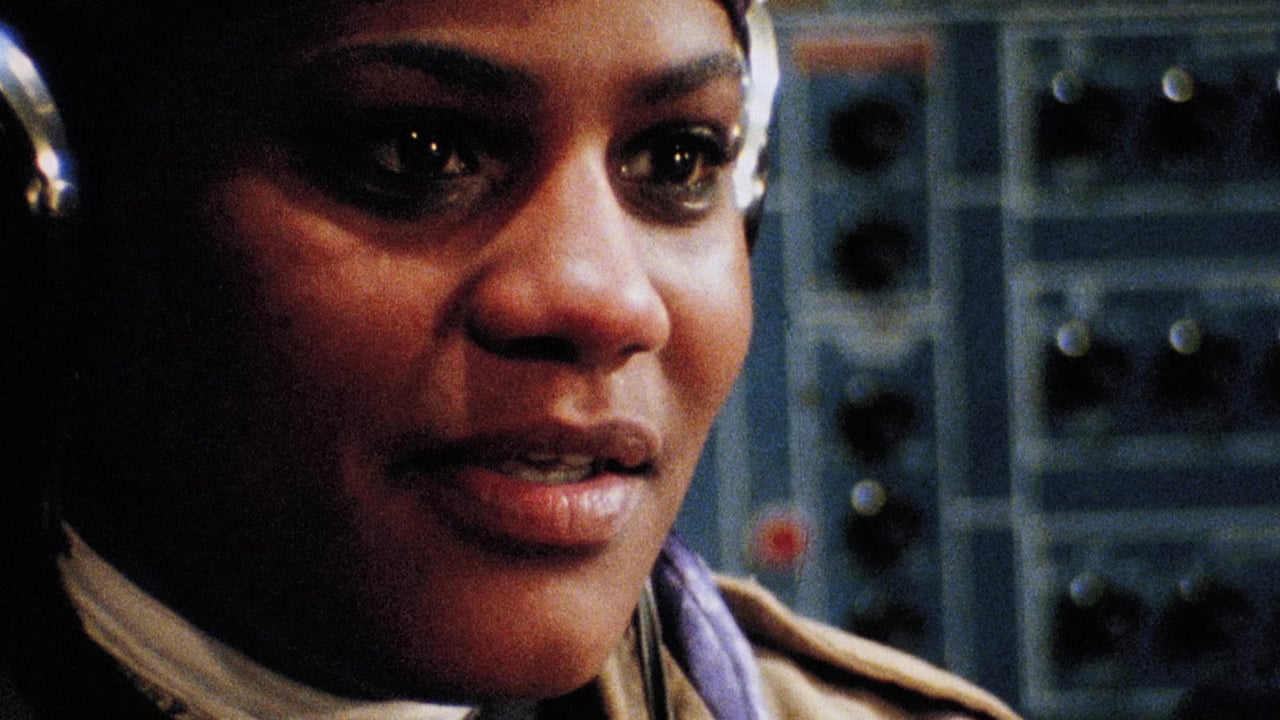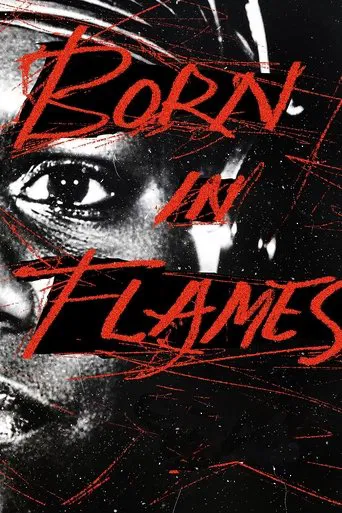StunnaKrypto
Self-important, over-dramatic, uninspired.
BelSports
This is a coming of age storyline that you've seen in one form or another for decades. It takes a truly unique voice to make yet another one worth watching.
Robert Joyner
The plot isn't so bad, but the pace of storytelling is too slow which makes people bored. Certain moments are so obvious and unnecessary for the main plot. I would've fast-forwarded those moments if it was an online streaming. The ending looks like implying a sequel, not sure if this movie will get one
MisterWhiplash
There is so much to unpack about Born in Flames after a first viewing (much belated I must say, I feel regret this wasn't there or I didn't find it when I was younger), but the first thing that comes to mind about it is television and media. Where do all of these "issues" - I put that word in quotes for almost ironic purposes, as worker's rights" equality for women, equality for *black women*, homosexuals and other women who have been made to become second class citizens as their quasi-original sin based on their gender and/or who they were born to in society - intersect and become amplified, or have the chance to? You gotta be on television, dummy! Borden's use of TV as this dangerous, insidious medium, where the great damage is really/often by these men (and sometimes bourgeois white women) in their glasses and suits seeming to have authority when dismissing attitudes and just ideas of the other, is staggering. I think this, even more than the title song, is the glue and spine of how this all can stick together.I say stick since this is, really, experimental and punk rock cinema at its fiercest and dirtiest. Borden at first gives this the appearance of a documentary - Chris Hegedus and DA Pennebaker turn up in the credits, though the latter I think was a special thanks it shouldn't be underestimated his influence here - but it is not quite that. Sure, that is blood flowing through this stylistically, but there are many scenes shot and meant to be scripted with actors as well. Then you throw in archival footage of demonstrations and other things - actual marches, police beatings and rages against the system, from what appears to be the past ten years - and it takes on a shape that is all its own. It's like if you had dropped Peter Watkins in the lower East side, and he hadn't been born Peter but, well, a woman, and one who understands her place is total shit in society.Is it messy as all get out? Could any bits be cut? Im sure if I saw it again id find a place or two. Would I dare tell her where? Not a chance. This has the energy of revolutionary cinema, and I dont mean that more polished but didactic kind one may have seen from Godard in the 60s, albeit that sense of ambition is there. This has a big cast of characters, from the black section of the women's army to the (white, middle class seeming, including Kathryn Bigelow?!) journalists trying to meet the women halfway, to the agents hounding the women on their trail (these scenes carry the kind of authenticity that made me think of how the FBI also infiltrated and tried to put the kabosh on the Black Panthers, which was also full of women), and the women in the pirate radio stations giving fuel to the fire on the streets and so on. Sprinkled in are vignettes showing right at street level women being oppressed economically and with their bodies. Early on the first action taken by the womens group is to bicycle around to police attacks when no one else will. And then, well, the guns become a necessary evil for them.Is there some wish fulfillment and flights of fantasy? I'm sure there are. At the same time everything is of the same piece which is Borden saying: there is already economic suffering for everyone, but if you don't come to our help, there cant be equality in a country - regardless of if this post "liberation" as this is meant to be set ten years after (I thought of Hunger Games, except Born in Flames would eat that dystopia for lunch) - whether it is construction workers or sex workers or a waitress or whomever. And Borden goes goes the extra provocative step of... Violence is not something preferable but, well, what else is there to do if you men wont stay by our sides in the fight against the corporations?One might say that this isn't as relevant anymore; the women's marches last and this year were full of men not only supportive but possibly empathetic to the struggle which is constant in an America that values wealth and whiteness and the MALEness and all that horseshit bag of chips (just look at the president). With the exception of the last scene, which hasn't aged well for what will be obvious reasons to anyone who's been alive since this film came out, it actually is even more relevant than ever. When a piece of science fiction satire about the falsehoods and depravity and decay of society is made it's about when it is written - 1984 is about the 1948 Orwell was in, Huxley in 1932 with Brave New World, many of Dick's works, Hunger Games too to a lessor extent - and Born in Flames is Borden looking at Americans in the time of that "New" America of Reagan saying "no, things aren't right, things are really worse despite the women's movement that did little, and if you don't see the class issue above all else then you'll never come to see through our eyes."In other words, any of the technical amateurism here (acting too, though theres more good and natural performing than not, especially from the black actors) is all not of concern when substantively this is one of the richest works of volcanic-hot, Pompeii-the-Earth satire that has existed from an American filmmaker.
Red-Barracuda
Made over six years between 1977-83, this film reminded me strongly of the films labelled the No Wave. These were underground lo-fi movies made primarily in New York in the late 70's / early 80's. They often had political messages and were uncompromisingly uncommercial. I'm not sure but I would think that Lizzie Borden's feature Born in Flames must surely qualify as one, as this is a wilfully challenging and direct bit of underground cinema which is a rallying cry to women generally. It has a sci-fi premise. In the near future, America is celebrating the tenth anniversary of a socialist revolution but despite this, many issues remain the same, such as racism, homophobia and sexism. A militant group called the Women's Army have been formed, they take direct action to fight for women's rights. Their leader is arrested for a minor offense and mysteriously dies in custody in prison, leading to further revolution.I'll come out and admit it straight away that I didn't fully enjoy this one. Not on ideological grounds but merely because I did not find the film fully engaging due to its fragmented experimental presentation. Having said that, I do respect what it was doing and it does have an unmistakable energy to it which I found interesting. It's clearly low-budget as underground films always are but it definitely has ambition for sure. It takes the form of a pseudo-documentary and mixes in some real news footage in with staged material. The actors are all amateur but this does ensure the feel remains more radical and less watered down. It focuses on feminist politics primarily and it does have to be said that many of the issues discussed still exist today so it does still have a relevance in terms of what it is saying. I also enjoyed the punk soundtrack which had a sort of proto riot grrrl feel to it. So, while I cannot pretend to have fully engaged with this one, I do respect it and admit it has a certain unique feel.
sonya90028
This is a very radical political film. As a black lesbian feminist, I could relate to the premise of this film. The plot unfolds in a semi-documentary style, making this film all the more interesting. Set against the gritty backdrop NYC, the film has a distinctly apocalyptic feel to it. This movie harks back to the militant, left-wing revolutionary fervor, of the 60s and early 70s. Despite the changes in society resulting from feminism, gay rights, and the civil rights movement in the last 40 years, this movie shows that there's still much work to be done, to achieve real equality for all. It's not surprising to me that the radical political movement in the film, is led by a working-class black lesbian. Women who happen to be lesbian, blue-collar, and of color, are still the most oppressed people in our society.Jean Satterfield is superb as Adelaide Norris, the dedicated member of the Women's Army. Jean conveys the militant stance of Adelaide, in a very visceral way. The supporting cast of this film, was also compelling. Especially Honey as Honey, the feminist revolutionary radio DJ. The film was slow-moving at times, but packed an emotional punch.Rights of the oppressed in society, have been rolled-back by right-wing conservatives for the past 28 years. So, we could use a radical political strategy that addresses the rights of the oppressed again, like we did in the 60s and 70s. History has been known to repeat itself. In this day and age, a radical uprising by women in pursuit of equality, is needed more than ever. This movie could very well be a sign of things to come, in that regard. I recommend this film, to all who take women's rights seriously, and want to become more aware of women's oppression in society.
hampuseurenius
I'm surprised that so many people like this film. I found it boring, weird and incoherent. I assume that the filmmaker's goal was to attract a female feminist audience. Important questions of womens rights are brought up for discussion. But the incoherence of the narrative and the low quality of the cinematography, sound and acting only makes it a pain to watch. So therefore I don't want to recommend it to anyone. I can understand that some people find this film interesting because they are interested in the questions that it deals with. Questions of equal rights for women and homosexuals are very important to talk about. They were hot issues back in 1983 and they are still important. But I think that many people mix up what is interesting politically and what is a good film. This is definitely not a good film.

